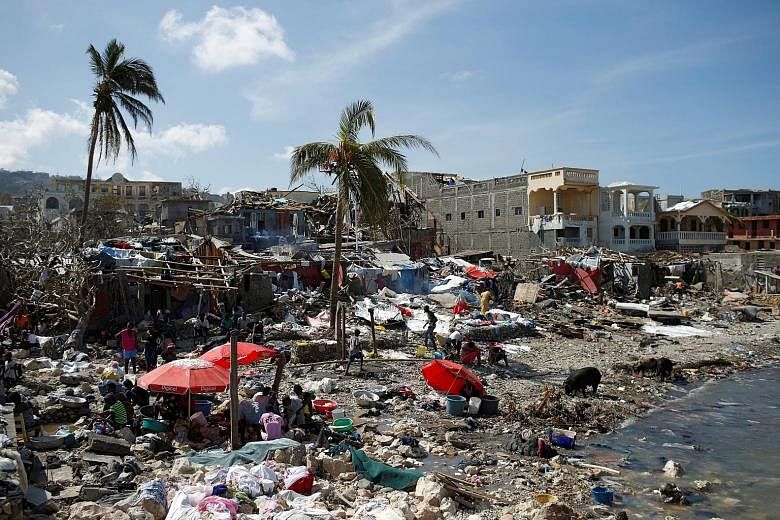PORT-AU-PRINCE • Cholera has killed at least 13 people in southwestern Haiti in the wake of Matthew, now a post-tropical cyclone, as government teams fanned out across the hard-hit south-western tip of the country to repair treatment centres.
Before Matthew weakened from a hurricane, it took the lives of nearly 900 people in Haiti, many in remote towns clustered near the headland, according to a Reuters tally of numbers given by local officials.
Haiti's central civil protection agency raised to 336 its official death toll, a slower count because officials must visit each village to confirm the numbers. Haiti began three days of mourning yesterday.
Six people died of cholera in a hospital in the town of Randel, which is inland on the peninsula, and another seven died in the coastal town of Anse-d'Ainault on the western tip, officials said on Saturday, likely the result of flood waters mixing with sewage.
Cholera causes severe diarrhoea and can kill within hours if untreated. It is spread through contaminated water and has a short incubation period, which leads to rapid outbreaks.
"Randel is isolated, you must cross water, you must go high in the mountains, cars cannot go, motorcycles cannot go," said Mr Eli Pierre Celestin, a member of the team that fights cholera for the health ministry.
"People have started dying... There are nurses but no doctors," he said, concerned that cholera will spread due to a lack of hygiene and as ground water moves because of rain and floods.
He said there were also outbreaks in Port-a-Piment and Les Anglais, towns at the end of the Tiburon peninsula hardest hit by Matthew.
Dr Donald Francois, head of the Haitian health ministry's cholera programme, said 62 others were sick with cholera as a result of the storm. He said he was travelling to the south to oversee the response.
Port Salut, one of several picturesque beach towns ravaged by waves, wind and rain, counted its first cholera case in seven months last Saturday, and two more suspected cases were brought by ambulance to the town's clinic.
Cholera was accidentally introduced to Haiti by United Nations peacekeepers after the 2010 earthquake and has since infected hundreds of thousands of people and killed more than 9,000 of them.
The aid group Doctors Without Borders scrambled teams by helicopter to southern Haiti to respond to cholera cases.
Before the hurricane struck, the Central Emergency Response Fund (CERF) had released a loan of US$8 million (S$11 million) to the United Nations Children's Fund to ramp up the response to a worsening cholera epidemic in Haiti.
"In 2016, almost 27,000 cholera cases have been reported in Haiti, and over 240 people have died. Hurricane Matthew is feared to significantly worsen the situation and increase the risk of a larger outbreak," CERF said last Friday.
As the shock of the storm wore off, the enormity of the damage was beginning to sink in.
"I have land but I don't have a house any more. It's starting to traumatise me, my head hurts. I think about it too much," said survivor Jean Vinel Joseph, 36.
REUTERS

